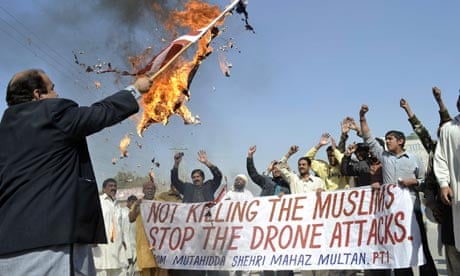The US airstrike last week, which killed the Tehrik-e-Taliban Pakistan (TTP) second in command Wali ur Rehman has again raised the contentious issue about the legality of US drone strikes in Pakistan. The United States, like many of its allies across the international community were quick to hail this operation a success. Yet underneath this bravado lays a very serious question and that is" despite killing high profile figures such as Wali ur Rehman and Baitullah Mehsud in 2009, the methods used to target the Taliban may in actual fact be acting as a recruitment tool for extremist organisations in Pakistan who have an apathy towards the Taliban.
The latest airstrike came as the dust was settling from the recent Pakistani elections. At a crucial time when the TPP were willing to hold "peace talks" with the new Pakistani Nawaz Sharif administration, this US airstrike seems to again have reignited anti-US/Pak relations. The drone strikes are mainly used in the federally administered tribal areas, and whilst accurate statistics about the number of drone strikes and casualties are difficult to ascertain because of the nature of access, the Bureau of Investigative Journalists has argued that at least 2,541 to 3,540 people have been killed in drone attacks and almost 411 to 884 of those are civilians.
When Imran Khan, the cricketer turned politician and leader of the Pakistani Tehreek-e-Insaf party famously said he would shoot down a drone if elected as Pakistan's next prime minister, many commentators viewed it as light satire appealing to the middle class vote. Yet his statement does appear to represent the majority of Pakistani's views on drone attacks. A 2011 Pew poll of drone attacks, for example, showed that 89% of Pakistani citizens argue that drones kill innocent people. Moreover, a report published by Stanford and New York Universities in 2011 showed the scale of the psychological impact drone attacks had on Pakistani civilians who felt "terrorised" by them.
The most damning piece of evidence against the use of drone strikes was in March 2011 when 40 people were killed, many of whom were civilians at a local tribal meeting. Thus, public perception of drones in Pakistan is one that portrays a lack of trust and confidence in the Pakistani government for its pro-drone stance which has inevitably left a vacuum for extremist groups like the TPP and others that gives them an opportunity to amplify their actions and raise the public alarm through a number of well-coordinated and sophisticated terrorist assaults upon the public.
The use of drone strikes also allows the Taliban to win the "hearts and minds" game and as a result it has been successful at recruiting disaffected Pakistanis from within the villages and streets using emotive and effective propaganda tools such as CDs and DVDs, which are used in local Madrassahs across the Punjab and Khyber Pakhtunkhwa, where they can effectively operate with a free reign. Much of the literature uses motivational powerful themes which would appeal to the youth and at the same time allow the Taliban to recruit future generations by adopting a strong anti-US narrative and using religion and theology to justify their actions.
Indeed, this is true in the rise of "lone wolf" terrorists such as the Pakistani-born US citizen Faisal Shahzad, who attempted to detonate a bomb in Time Square. In his trial Shahzad cited the drone strikes in Pakistan as one of the reasons for his grievance against US policy makers. Interestingly, Obama has done everything possible to distance himself from the George W Bush administration policies on the "war on terror", yet he continues to support the drone strikes, a policy brought in by the former president. Obama and his Vice-President Joe Biden have recently been attempting to justify the use of drones through a blaze of interviews via social networking sites. In a recent video session on Google+, President Obama justified the use of drones as the only means to avoid "intrusive military action".
The use of drones violates Pakistan's sovereignty and whilst the death of Wali ur Rehman will be celebrated across the United States and afar, for ordinary Pakistanis there is a chilling reminder that reprisal attacks are around the corner. US drones put all Pakistani's at risk and therefore are counter-productive in defeating the Taliban. Their legality can also be questioned and ultimately their psychological impact on Pakistanis and inhumane manner in which they have killed many innocent civilians is fermenting and radicalizing more people and creating a destabilised Pakistani society.
Within this heightened atmosphere, a hydra global insurgency from a plethora of extremist groups in Pakistan has emerged that have links to al-Qaida led extremism and are willing to die to avenge the death of their leaders.
.
